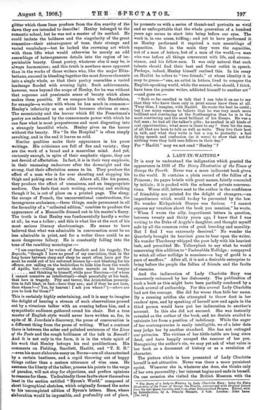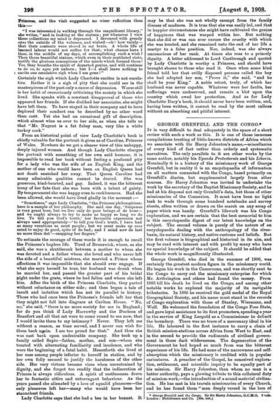A LADY - IN - WAITING.* IT is easy to understand the indignation which
greeted the' appearance in 1838 of The Diary Illustrative of the Times of George the Fourth. Never was a more indiscreet book given to the world. It contains a plain record of the follies of a Princess ; its pages bristle with great names, faintly concealed by initials ; it is packed with the echoes of private conversa- tions. Worse still, letters sent to the author in the confidence of friendship are printed for the delight of strangers,—an impertinence which would to-day be prevented by the law; No wonder Kirkpatrick Sharpe was furious. "I cannot express my vexation about the book you mention," he wrote. "When I wrote the silly, impertinent letters in question, between twenty and thirty years ago, I knew that I was writing to the Duke of Argyle's daughter, and thought myself safe by all the common rules of good breeding and morality. But I find I was extremely deceived." No wonder the Quarterly brought its heaviest guns to bear upon the writer. No wonder Thackeray whipped the poor lady with his heaviest lash, and permitted Mr. Yellowplush to say what he would concerning this addition to "Fashnabble Nollidge : compared to witch all other nollidge is nonsince—a bag of goold to a pare of snuffers." After all, it is not a desirable enterprise to bring before the people the follies of friends and the faults of enemies.
And the indiscretion of Lady Charlotte Bury was immensely enhanced by her dishonesty. The publication' of such a book as this might have been partially condoned by a frank avowal of authorship. For this avowal Lady Charlotte bad not the courage. She did far worse than hide her name. By a cunning artifice she attempted to throw dust in her readers' eyes, and by speaking of herself now and again in the third person would have put her indiscretion to another's account. In this she did not succeed. She was instantly revealed as the author of the book, and no denials availed to extricate her from a position of indelicacy. While the anger of her contemporaries is easily intelligible, we of a later date may judge her by another standard. She has not outraged our privacies. The victims of her.tittle-tattle are long since dead, and have happily escaped the rancour of her pen. Recognising the author's sin, we may yet ask of what value is her book as a document of history or as a revelation of character.
The picture which is here presented of Lady Charlotte herself is not attractive. Never was there a more persistent egoist. Wherever she is, whatever she does, she thinks only of her own personality ; her interest begins and ends in herself. On one occasion she visited the British Museum with the The Diary of a Lady-in•Waiting by Lady Charlotte Eery: being the Diary Illustrative of the Times of George the Fourth, interspersed with Original Letters from the late Queen Caroline andfroni other Distinguished Persons. Edited ielth an Introduction, by A. Francis Steuart. 2 vols. London : John Lino. [21s. net.]
Princess, and the visit suggested no wiser reflection than this :—
"I was interested in walking through the magnificent library," ebe writes, "and in looking at the statues; yet whenever I view these collections my mind is depressed. I devoured with greedy eyes the outside of the volumes, and wished—oh ! how vainly— that their contents were stored in my brain. A whole life of learned labour would not suffice for that; what chance have I then, in the middle of my days, of accomplishing such a wish ? Then those beautiful statues, which even in their mutilated state, testify the glorious conceptions of the minds which formed them ! Yes, they breathe the spirit of departed genius, and will continue to do so, to ages yet unborn ; but I—I shall leave nothing to excite one emulative sigh when I am gone!"
Qertainly the sigh which Lady Charlotte excites is not emula- tive. Rather it is a sigh of pity that she could see in the
masterpieces of the past only a cause of depression. Worse still is her habit of censoriously criticising the society in which she lived. She speaks with a constant disapproval of those who appeared her friends. If she disliked her associates, she might have left them. To have stayed in their company and to have deplored their conduct can be described by no other word than cant. Yet she had an occasional gift of description, which almost wins us over to her side, as when she tells us that "Mr. Nugent is a fat fubsy man, very like a white turkey cock."
From an historical point of view Lady Charlotte's book is chiefly valuable for the portrait it gives us of Caroline, Princess of Wales. Nowhere do we get a clearer view of this unhappy, deeply injured woman. And though Lady Charlotte charges the portrait with something of her own acid humour, it is impossible to read her book without feeling a profound pity for a lady who was the wife of an English King, and the mother of one who would have been an English Queen had not death snatched her away. That Queen Caroline had many admirable qualities cannot be denied. She was
generous, kind-hearted, and gay. Indeed, it was the bitterest irony of her fate that she was born with a talent of gaiety. By temperament she was happy even to recklessness. Had she been allowed, she would have lived gladly in the moment :— "Sometimes," says Lady Charlotte, "the Princess philosophises: here is a sample of her philosophy. She said one day, 'Suspense i8 very great bore, but we live only de poor beings of de hour— and we ought always to try to make us happy so long we do live. To tell you God's truth,' her favourite expression not always used appropriately= to tell you God's truth, I have had as many vexations as most people ; but we must make up vons mind to enjoy de good, spite of de bad; and I mind now de last no more than dat'—snapping her fingers."
To estimate the courage of these words it is enough to recall the Princess's hapless life. Tired of Brunswick, where, as she said, she was a shuttlecock between a mother to whom she was devoted and a father whom she loved and who never left the side of a beautiful mistress, she married a Prince whose affections it was impossible that she should ever engage. If what she says herself be true, her husband was drunk when he married her, and passed the greater part of his bridal night under the grate, where he had fallen and where she left him. After the birth of the Princess Charlotte, they parted without reluctance on either side ; and then began a tale of insult and isolation which has not its parallel in history. Those who had once been the Princess's friends left her that they might not fall into disgrace at Carlton House. "No, no," she said, "there is no more society for me in England ; for do you think if Lady Harrowby and the Duchess of Beaufort and all that set were to come round to me now, that I would invite them to my intimacy ? Never. They left me without a reason, as time served, and I never can wish for them back again. I am too proud for that." And thus she was cast back upon undesirable company. She took up a family called Sapio—father, mother, and son—whom she treated with alternating familiarity and insolence, and who were the beginning of a fatal habit. Henceforth she lived at her ease among people inferior to herself in station, and by her own folly seemed to justify the harshness of the other side. Her very virtues became vices when unrestrained by dignity, and she forgot too readily that the indiscretion of Princes is always ridiculous. A spirit of restlessness drove her to fantastic attire and extravagant behaviour. As the years passed she alienated by a love of squalid pleasures—the only pleasures left her—many who would have been her 'staunchest friends.
Lady Charlotte says that she had a bee in her bonnet. It may be that she was not wholly exempt from the family disease of madness. It is true that she was easily led, and that in happier circumstances she might have cultivated the genius of happiness that was warped within her. Bat nothing that she did or was can ever excuse the cruelty with which she was treated, and she remained unto the end of her life a martyr to a false position. Nor, indeed, was she always unconscious of her rank. At times she rose to a princely dignity. A letter addressed to Lord Castlereagh and quoted by Lady Charlotte is worthy a Princess, and should have brought shame to those who read it. Once when some kind friend told her that evilly disposed persons called the boy she had adopted her son, "Prove it," she said, "and he shall be your King." A noble retort, truly, of which her husband was never capable. Whatever were her faults, her sufferings were undeserved, and remain a blot upon the country which owed her protection. And as for Lady Charlotte Bury's book, it should never have been written, and, having been written, it cannot be read by the most callous without an absorbing and pitiful interest.



































 Previous page
Previous page